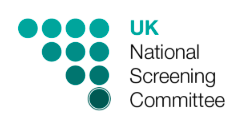Submitting a research request to the RMG
Updated 9 December 2024
1. Overview
This document sets out guidance for submitting requests for advice to the UK National Screening Committee (UK NSC) Research and Methodology Group (RMG).
The RMG meets 4 times a year. Any submissions received up to 4 weeks before a meeting date will be evaluated at that meeting. The RMG aims to respond to applicants within 6 weeks of its meetings.
Applicants should complete all relevant sections of the request form and submit it to uknsc@dhsc.gov.uk.
2. Scope of RMG advice
The expert RMG was set up to support closer alignment between research, researchers and screening recommendations. Part of its role is to provide advice to people or research bodies that are conducting or proposing screening studies.
This covers a range of methodology and impact issues aimed at supporting good quality research that has the best chance of impacting screening policy.
The UK NSC is an independent scientific advisory committee. It makes recommendations based on a range of criteria. These critically include empirical evidence, but also ethics, feasibility, acceptability and expert input.
This means that support from the RMG for a particular study design or protocol is not a guarantee that a positive finding will immediately be the basis for a positive screening recommendation, but it will increase the likelihood of influencing the UK NSC’s considerations.
3. Screening research principles
Screening research requests should relate to topics that are within the UK NSC’s remit.
The UK NSC considers population, targeted and stratified screening programmes. It does not examine, or make recommendations on, clinical management or risk assessment as part of routine clinical care.
The ethical principles of health screening are encompassed within the UK NSC evidence review criteria. Screening topics should adhere to the committee’s 4 broad ethical principles to:
- improve health and wellbeing
- treat people with respect
- promote equality and inclusion
- use public resources fairly and proportionately
Following its evidence review process, the UK NSC only recommends screening if:
-
robust (peer reviewed and published) evidence shows it will do more good than harm at reasonable cost
-
robust evidence shows that such a programme will affect important health outcomes
-
a comprehensive quality-assured end-to-end screening programme can be put in place, delivered to pre-agreed, nationally set standards
All screening programmes have the potential to do harm to individuals. It is important for research to accurately measure the harms of screening as well as the benefits. Important harms include anxiety caused by false positive screening test results, overdiagnosis and overtreatment of clinically insignificant disease, harmful side-effects of treatment, and finding of uncertain clinical significance.
It is also an ethical imperative that people are given unbiased, timely, balanced information in a format they can understand to help them make an informed choice about screening.

